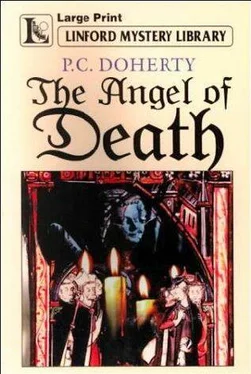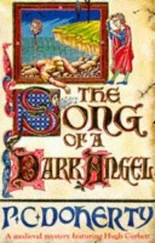Paul Doherty - Angel of Death
Здесь есть возможность читать онлайн «Paul Doherty - Angel of Death» весь текст электронной книги совершенно бесплатно (целиком полную версию без сокращений). В некоторых случаях можно слушать аудио, скачать через торрент в формате fb2 и присутствует краткое содержание. Жанр: Исторический детектив, на английском языке. Описание произведения, (предисловие) а так же отзывы посетителей доступны на портале библиотеки ЛибКат.
- Название:Angel of Death
- Автор:
- Жанр:
- Год:неизвестен
- ISBN:нет данных
- Рейтинг книги:4 / 5. Голосов: 1
-
Избранное:Добавить в избранное
- Отзывы:
-
Ваша оценка:
- 80
- 1
- 2
- 3
- 4
- 5
Angel of Death: краткое содержание, описание и аннотация
Предлагаем к чтению аннотацию, описание, краткое содержание или предисловие (зависит от того, что написал сам автор книги «Angel of Death»). Если вы не нашли необходимую информацию о книге — напишите в комментариях, мы постараемся отыскать её.
Angel of Death — читать онлайн бесплатно полную книгу (весь текст) целиком
Ниже представлен текст книги, разбитый по страницам. Система сохранения места последней прочитанной страницы, позволяет с удобством читать онлайн бесплатно книгу «Angel of Death», без необходимости каждый раз заново искать на чём Вы остановились. Поставьте закладку, и сможете в любой момент перейти на страницу, на которой закончили чтение.
Интервал:
Закладка:
The next morning Corbett, regretting his idleness of the previous day, rose and busied himself. Ranulf was roused and sent to Westminster with two letters: the first to the king; the second, Corbett hoped a royal messenger would deliver to Maeve, some time over the next few weeks. He instructed Ranulf to meet him at The Standard in Cheapside and, as his servant ran down the stairs, Corbett condnued with his other tasks. There were provisions to be bought, matters to be dealt with. Finally, having dressed and armed himself, he wrapped a heavy, military cloak around him, went downstairs and out into Bread Street.
The city was still covered with a thick mist which made the figures he passed seem like phantasms from a dream. Underfoot, the ground was now slippery and ice-hard. Corbett stayed in the middle of the street and tried to avoid the hard-packed snow which was still falling off the roofs, whilst making every attempt not to slip into the sewer which ran down the middle. Corbett soon found walking was now a very dangerous occupation. He stopped to help a fat-bottomed mercer's wife who had slipped onto her backside, a look of absolute amazement on her face. She would have sat there for the whole day, being taunted by urchins, had Corbett not come to help her. He strolled onto Cheapside and, turning right, entered the church of St Mary-le-Bow.
Corbett remembered the church when its doors and windows had been covered up with briars and the main gate barred. The whole place was excommunicated by the Archbishop of Canterbury, because it had been the headquarters of a satanic coven plotting against the king. Corbett recalled all this as he entered the church, fleetingly remembering Alice who had led the coven and with whom he had become deeply infatuated. He thought of her dark face and secretive eyes, realizing with a pang how the passage of years had still not really healed that wound. Now, however, St Mary's was different: clean, freshly painted, with new rectors installed and the school there recognized. It was now Corbett's parish church. In fact, he belonged to its fraternity of Corpus Christi, a society including aldermen, mercers, merchants and tradesmen, who had joined together for social and religious reasons. Corbett paid money every year for a chancery priest to sing masses for the repose of the souls of his wife and child and, though they did not know it, for the soul of Alice-atte-Bow, the leader of the satanic coven.
Corbett chatted to the priest, ensured all was well and became involved in a brief debate with one of the aldermen of the ward. London was divided into wards; it had twelve such, each with an alderman who supervized most of the secular and religious affairs in his quarter. Each person living there had to pay a tax. Corbett, although he could well afford it, had always resisted this because, by royal ordinance, clerks, together with knights and squires, were exempted from the levy. The alderman, however, was now insisting Corbett should pay for Ranulf; but the clerk evaded the issue claiming that because Ranulf was an apprentice-at-law he should also be excluded from this local tax. The alderman regretfully agreed. Corbett, however, failed to add that Ranulf s knowledge of the law was honoured more in the breach than in its observance. He also neglected to mention Ranulf s new addition to the ward.
13
As he moved from St Mary-le-Bow down Cheapside into Poultry, Corbett realized the city was at last trying to reassert itself against the inclement weather. The courts had certainly been busy. A line of felons and night-walkers, the whores in striped hoods and each carrying a white wand, were being led off to the prison at the Tun in Cornhill. The stocks were also full with bakers and fishmongers, their foul produce being burnt under their noses. Another man accused of slander had a whetstone round his neck and a placard calling him a false liar for all to ridicule.
As Corbett saw the whores he remembered Abigail, the woman who lived in de Montfort's house in Candlewick Street. Again he wondered if she had played a part in the murder. She had been present at the mass and de Montfort, never the most pleasant of people, had threatened her with public insult; any whore thrice convicted could be whipped from prison to the city bounds and told to abjure the city for ever. There again, and so Corbett dismissed the idea, if de Montfort's liaison with any courtesan was known, he too would be taken to the open prison at the Tun at Cornhill and there exposed all day for public ridicule. Corbett stopped to watch the chaos surrounding a huge canopied wagon which had overturned, spilling its produce out into the slushy show. The carter and his apprentices were driving off the urchins and would-be thieves. The confusion he was watching reflected what was going on in his own mind. Why should a man who had achieved so much risk it all in order to manage a brothel? De Montfort would have fallen from grace if that had become public knowledge. Perhaps the solution was to do with frustrated arrogance: de Montfort, having reached the pinnacle of his career, perhaps believed he could do things forbidden to others and specifically denied to priests?
Corbett found Ranulf waiting for him and gave him some silver to go and purchase certain foodstuffs they needed; whilst he went to the shop of his banker, Gisors the goldsmith, a modest affair which seemed to argue against the accumulated wealth of the merchant. Inside, Corbett looked around at the neatly stacked leather trunks and the parchment rolls, each docketed and tagged, listing those who had banked with Gisors, to whom he had lent gold and at what rates. In spite of the Church's ruling about usury, the banking and depositing of money was now a thriving business in the capital. The goldsmith greeted Corbett with his usual subservience. The clerk was a regular and trusted customer, the sort, beloved by any banker, who deposits silver and gold and rarely takes away again. This morning, however, Corbett disappointed him. Usually, the clerk stayed and shared the gossip of the court and the palace, information, however petty, Gisors could always use. This morning the clerk was curt, absent-minded; he stated what he wanted and, once Gisors had counted the money out into a small leather purse, took it with a mutter of thanks and left the shop.
Corbett breakfasted in the tavern where he was joined by Ranulf, who had spent a profitable hour buying the provisions they needed. He returned the little that was left of Corbett's silver.
The clerk looked down at it. 'Is that all?'
'Yes, Master.'
Corbett groaned quietly. He had been so engrossed in this matter and other affairs of the court that he had neglected to keep an eye on his money. He had forgotten how the cruel winter would have sent the price of goods soaring. Two loaves usually cost a penny, but now the price had doubled; the same went for vegetables, meat, drink and anything brought into the city from the country. Once Ranulf had eaten, they left and went back up Cheapside towards St Paul's. The mist was beginning to lift and there were more people in the market-place. So immersed was Corbett in the coming meeting with Plumpton, giving half an ear to Ranulf s protests about the price of things, that neither he nor his servant noticed the young man with slit eyes, pock-marked face and long greasy hair, dressed completely in black, who had followed them from the tavern like a bird of evil omen. The fellow kept them under scrutiny until they entered the precincts of St Paul's, then he smiled and, with a nod of satisfaction, walked away.
In the courtyard Corbett stopped so Ranulf could watch the end of a miracle play. The stage was set on a two-storied affair on wheels, the lower tier where the actors dressed, the upper for the play itself. The stage, and its brilliant backdrop of a grotesquely painted mouth of hell with demons leaping out of it, was topped by a roof and a huge silver griffin. The story was of the Passion. The actor playing Christ, costumed in a white robe and a silver-braided wig, drew the sympathetic murmurs of the surrounding crowd; while Pilate, in his purple cloak and false red hair, drew jeers, boos, catcalls and the occasional piece of dirt. Ranulf would have stayed there longer but Corbett, tiring of the scene and fearful of the pickpockets he had recognized entering the crowd (one of them from a court case he'd attended a few months previously), pulled his protesting servant up into the doorway of the cathedral. The nave was crowded and noisy with business: parchment-sellers, professional scribes, lawyers talking loudly, servants waiting to be hired. They pushed through these and made their way up into the choir; by the smell of candle-grease and incense, Corbett knew that nones had just finished.
Читать дальшеИнтервал:
Закладка:
Похожие книги на «Angel of Death»
Представляем Вашему вниманию похожие книги на «Angel of Death» списком для выбора. Мы отобрали схожую по названию и смыслу литературу в надежде предоставить читателям больше вариантов отыскать новые, интересные, ещё непрочитанные произведения.
Обсуждение, отзывы о книге «Angel of Death» и просто собственные мнения читателей. Оставьте ваши комментарии, напишите, что Вы думаете о произведении, его смысле или главных героях. Укажите что конкретно понравилось, а что нет, и почему Вы так считаете.












